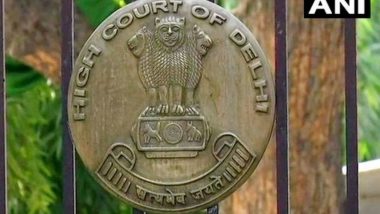New Delhi, August 27: Artificial intelligence (AI) can substitute neither the human intelligence nor the humane element in the adjudicatory process, the Delhi High Court has held and said ChatGPT can't be the basis of adjudication of legal or factual issues in a court of law. Justice Prathiba M Singh stated that the accuracy and reliability of AI generated data is still in the grey area and at best, such a tool can be utilised for a preliminary understanding or for preliminary research.
The court's observations came while dealing with a lawsuit by luxury brand Christian Louboutin against a partnership firm involved in the manufacture and sale of shoes allegedly in violation of its trademark. The counsel for the plaintiff submitted that “Red Sole Shoe” was its registered trademark in India and placed before court responses by ChatGPT with respect to its “reputation”. Microsoft Launcher Update: Tech Gaint Updates Launcher Application for Android To Get ChatGPT-Supported Bing Chat Integration.
“The said tool (ChatGPT) cannot be the basis of adjudication of legal or factual issues in a court of law. The response of a Large Language Model (LLM) based chatbots such as ChatGPT, which is sought to be relied upon by the Counsel for the Plaintiff, depends upon a host of factors including the nature and structure of query put by the user, the training data, etc. Further, there are possibilities of incorrect responses, fictional case laws, imaginative data etc. generated by AI chatbots,” said the court in a recent order.
“Accuracy and reliability of AI generated data is still in the grey area. There is no doubt in the mind of the Court that at the present stage of technological development, AI cannot substitute either the human intelligence or the humane element in the adjudicatory process. At best the tool could be utilised for a preliminary understanding or for preliminary research and nothing more,” the court observed. Based on the comparative analysis of the products of the two parties, the court ultimately ruled that the defendant had a “clear intention to imitate and gain monetarily on the strength of the reputation and goodwill” of the plaintiff.
“This Court has no doubt that the products of the Defendant are knock-offs or look-alikes of the Plaintiff's distinctive shoes and footwear. The Defendant has copied all the essential features of the Plaintiff's footwear such as 'Red Sole', 'Spiked Shoe Style', as also the prints. The imitation is not of one or two designs but of a large number of designs as the chart above indicates,” the court said.
The defendant agreed to undertake that it shall not copy or imitate any of the designs of the plaintiff's shoes and the court directed that in case of any breach of this undertaking, the defendant would be liable to pay Rs 25 lakh as damages to the plaintiff. Fortinet Layoffs: Cyber-Security Firm Lays Off Employees in Sales, Business Development and Channel Partners.
Considering that the defendant was also using the pictures of well-known Bollywood celebrities on its Instagram account and also displayed/sold the shoes in high-end malls, it was directed that the defendant shall pay a sum of Rs 2 lakh as costs to the plaintiff.













 Quickly
Quickly



















